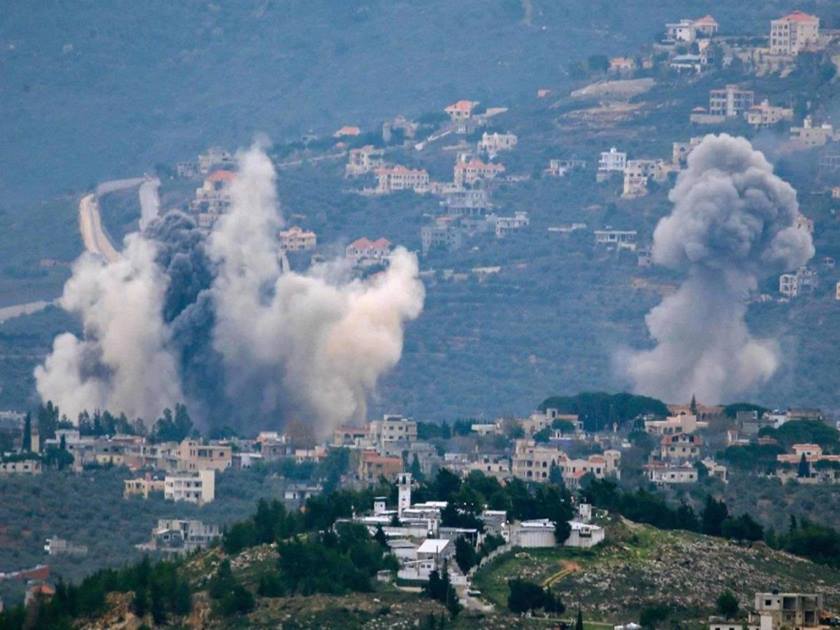Doha News spoke to members of the Lebanese diaspora in Qatar who are distraught following Israel’s heavy bombardment on their country on Monday.
Israel’s air strikes on southern Lebanon have killed at least 558 people, including 50 children, and injured more than 1,645, marking the country’s deadliest day since the 1975-1990 civil war.
According to Lebanon’s National News Agency, 492 of those were killed on Monday, resulting in tens of thousands to flee from their homes in southern and eastern Lebanon.
Zeinab, a Lebanese expatriate in Doha, was preparing for an office meeting on Monday when she first heard of the bombardments on Ghaziyeh, the coastal town where her maternal grandparents are currently based.
“I just collapsed and could not move,” she told Doha News. “I immediately thought about their safety.”
Zeinab was able to connect with her grandmother immediately and was told that her relatives were safe. Her grandfather was close to a missile’s target, she was told, but had moved just in time to be safe.
“That’s when it hit me,” she said. “Just a few minutes before and it could’ve hit my granddad.”
Thousands based in southern villages and in some neighbourhoods in Beirut had received messages and phone calls from an unknown Lebanese number earlier and purportedly from the Israeli army, ordering them to flee from Hezbollah’s bases.
Many of the residents, including Zeinab’s grandparents, prepared to flee towards the north, as missiles continued to rain down.
The main highway out of the southern port city of Sidon was jammed with cars heading towards Beirut in the biggest exodus since the 2006 fighting, as reported by Al Jazeera.
“Thank God they are in a safer place right now. They fled Ghaziyeh before midnight. I’m still worried because no one is safe from the strikes. They [Israelis] will hit anywhere if they want,” Zeinab added.
‘Our brothers and sisters are being killed’
For those who have relatives outside of southern and eastern Lebanon, it has been an equally concerning time.
Attacks targeting south of Beirut were more frequent on Tuesday and as people continue to search for shelter in the capital, there are fears that the escalation would only cause immense damages.
Jalal*, manager of a contracting company, said he stopped following the news, because of the worrying news at home.
“Our brothers and sisters are being killed. It is horrible seeing what is happening in our country from afar,” he told Doha News.
Although his immediate family is in Doha with him and those back home are away from the affected areas, he said watching everything unfold on the news was “sad and horrible”.
All of Lebanon and the wider region will continue to be affected if the Israeli offensive goes on, according to Sami Hermez, associate professor at Northwestern University in Qatar.
“At this point, it should not just be our connection to Lebanon that should impact our feelings,” Hermez said. “It should be what’s been happening to Palestinians, as well as what happens to people in southern Lebanon. That should motivate how one feels.”
Hermez, whose roots trace back to Lebanon and was involved in relief work post the 2006 Israeli-Hezbollah war, said he was “not surprised” with the escalation, pointing towards Israel’s intentions of provoking the rest of the Middle East.
Still, the author of War is Coming: Between Past and Future Violence in Lebanon, was taken aback by the number of people killed.
“I was expecting that something big was going to happen. I can’t help but feel somewhat demoralised when you see all this destruction of people dying,” he told Doha News.
Zeinab echoed the sentiment, adding she feels “helpless” away from the country she visited in June.
“I cannot be okay if my country is not okay,” Zaineb said.
Will dehumanisation continue in Lebanon?
On the backdrop of the ongoing conflict, UN’s Secretary-General Antonio Guterres warned world leaders against allowing Lebanon to be turned into “another Gaza” by unrelenting raids from Israel on Tuesday.
Despite Israel’s offensive in Gaza killing more than 41,467 people, according to the Palestinian Health Ministry, the international community has failed to stop its ongoing war.
In statements that bore resemblances to post-October 7 briefings, Israeli Prime Minister Benjamin Netanyahu said the military will continue to target Hezbollah and civilian homes that have a “missile in the living room and a rocket in the garage“.
“No one I know has a rocket in their houses,” Zeinab said. “Their tactics is to call everyone Hezbollah, which is not true.”
Hermez said dehumanisation has already begun in Lebanon to replicate the bombing patterns that continue to be observed in Gaza.
“I think in Western political spheres, this isn’t about Islamophobia so much as an anti-Palestinian, anti-Arab type of sentiment. The dehumanisation of Arabs, of people of the Levant, is prominent.
That is why a group [Hezbollah] coming to the aid of Palestinians is a moral duty, that any Arab state or I would go further, any state in the world should be doing so. It is a position enshrined in international law as the genocide convention requires that we intervene to save humanity.”
Although the latest set of attacks is a threat to an “already crumbling Lebanese state”, the people will continue to “persist and resist,” Hermez added, a sentiment that Zaineb has equally expressed.
“Everyone in Lebanon, regardless of their sects, will live in unity afterwards. Now is the time to unite and strive to stop the [Israeli] occupation,” Zaineb said.
*Names have been changed at the request of the interviewees.







